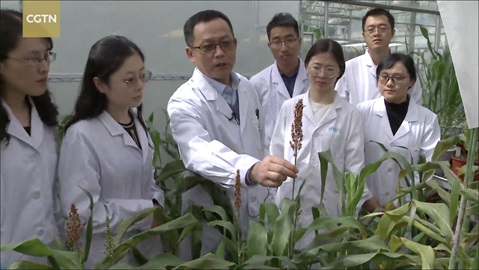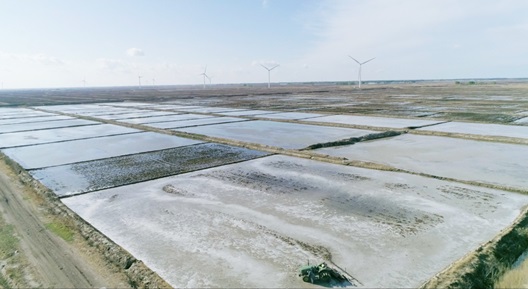Chinese scientists have discovered a key gene that helps crops tolerate saline conditions.
They named the gene "AT-1" (Alkali Tolerance One), saying that the discovery could help increase crop yield in saline-alkaline soils.
It's been found through analysis of different responses to alkali from a large number of sorghum varieties and their genome information.
"If the AT-1 modified crops can be planted in 20 percent of the salinized land on earth, there will be at least 250 million tonnes of additional crop yield per year worldwide," Xie Qi, a scientist from the Institute of Genetics and Developmental Biology in the Chinese Academy of Sciences, told CGTN.
An experiment is carried out at a lab in the Institute of Genetics and Developmental Biology in Chinese Academy of Sciences. /Chinese Academy of Sciences
The new finding goes beyond the past achievements of Chinese scientists. It's based on a study on sorghum, a conventional crop that originated in Africa where a large amount of soil has been salinized. But it has been applied to crops like rice, wheat, maize and millet.
"The gene relates to both salt and alkali while most reported genes previously were related only to salt. And across the world, 60 percent of sodic land is rich in alkaline, and only 40 percent mainly has salt. Because of this, the gene has pretty big value and significance in the application," Xia said. He is also the leader of the team formed by eight organizations in China on the project.
This team has been spending years of efforts, hoping to help increase agricultural production in sodic lands.
With scientific progress, sodic land has potential to grow crops that tolerate saline-alkaline conditions. /Chinese Academy of Sciences
Since 2017, they have been traveling to sodic lands in different parts of China to carry out numerous tests in difficult environments and weather.
"We conducted research on very different types of sorghum and found the gene ... before continuing with research on rice, wheat, maize, and millet," Xie said.
These scientists are concerned about food security and the decline of arable land across the world. They're hoping that by better utilizing the over 610 million hectares of sodic land around the world, they can ensure a better future for all mankind.
(Source: CGTN)
 Chinese scientists have discovered a key gene that helps crops tolerate saline conditions.They named the gene "AT-1" (Alkali Tolerance One), saying that the discovery could help increase crop yield in saline-alkaline soils.It's been found through analysis of different responses to alkali from a large number of sorghum varieties and their genome information."If the AT-1 modified crops can be planted in 20 percent of the salinized land on earth, there will be at least 250 million tonnes of additional crop yield per year worldwide," Xie Qi, a scientist from the Institute of Genetics and Developmental Biology in the Chinese Academy of Sciences, told CGTN.
Chinese scientists have discovered a key gene that helps crops tolerate saline conditions.They named the gene "AT-1" (Alkali Tolerance One), saying that the discovery could help increase crop yield in saline-alkaline soils.It's been found through analysis of different responses to alkali from a large number of sorghum varieties and their genome information."If the AT-1 modified crops can be planted in 20 percent of the salinized land on earth, there will be at least 250 million tonnes of additional crop yield per year worldwide," Xie Qi, a scientist from the Institute of Genetics and Developmental Biology in the Chinese Academy of Sciences, told CGTN. An experiment is carried out at a lab in the Institute of Genetics and Developmental Biology in Chinese Academy of Sciences. /Chinese Academy of SciencesThe new finding goes beyond the past achievements of Chinese scientists. It's based on a study on sorghum, a conventional crop that originated in Africa where a large amount of soil has been salinized. But it has been applied to crops like rice, wheat, maize and millet."The gene relates to both salt and alkali while most reported genes previously were related only to salt. And across the world, 60 percent of sodic land is rich in alkaline, and only 40 percent mainly has salt. Because of this, the gene has pretty big value and significance in the application," Xia said. He is also the leader of the team formed by eight organizations in China on the project.This team has been spending years of efforts, hoping to help increase agricultural production in sodic lands.
An experiment is carried out at a lab in the Institute of Genetics and Developmental Biology in Chinese Academy of Sciences. /Chinese Academy of SciencesThe new finding goes beyond the past achievements of Chinese scientists. It's based on a study on sorghum, a conventional crop that originated in Africa where a large amount of soil has been salinized. But it has been applied to crops like rice, wheat, maize and millet."The gene relates to both salt and alkali while most reported genes previously were related only to salt. And across the world, 60 percent of sodic land is rich in alkaline, and only 40 percent mainly has salt. Because of this, the gene has pretty big value and significance in the application," Xia said. He is also the leader of the team formed by eight organizations in China on the project.This team has been spending years of efforts, hoping to help increase agricultural production in sodic lands. With scientific progress, sodic land has potential to grow crops that tolerate saline-alkaline conditions. /Chinese Academy of SciencesSince 2017, they have been traveling to sodic lands in different parts of China to carry out numerous tests in difficult environments and weather."We conducted research on very different types of sorghum and found the gene ... before continuing with research on rice, wheat, maize, and millet," Xie said.These scientists are concerned about food security and the decline of arable land across the world. They're hoping that by better utilizing the over 610 million hectares of sodic land around the world, they can ensure a better future for all mankind.(Source: CGTN)
With scientific progress, sodic land has potential to grow crops that tolerate saline-alkaline conditions. /Chinese Academy of SciencesSince 2017, they have been traveling to sodic lands in different parts of China to carry out numerous tests in difficult environments and weather."We conducted research on very different types of sorghum and found the gene ... before continuing with research on rice, wheat, maize, and millet," Xie said.These scientists are concerned about food security and the decline of arable land across the world. They're hoping that by better utilizing the over 610 million hectares of sodic land around the world, they can ensure a better future for all mankind.(Source: CGTN) CAS
CAS
 中文
中文




.png)
